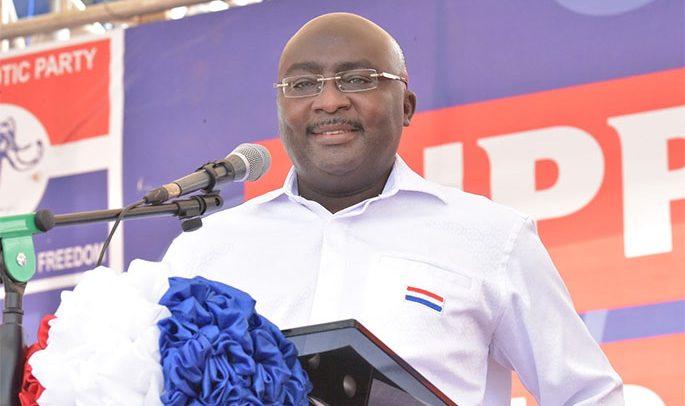Dr. Mahamudu Bawumia
A latest survey conducted by the Kumasi Technical University (KTU) ahead of the December elections has predicted a victory for the New Patriotic Party (NPP) flagbearer, Vice President Dr. Mahamadu Bawumia.
According to a survey carried out by Prof. Smart Sarpong, an Associate Professor of Statistics, 38.9% of Ghanaians support Dr. Bawumia over the opposition National Democratic Congress (NDC) presidential candidate, ex-President John Dramani Mahama.
Prof. Sarpong is also the Director of Research and Innovation at the Kwame Nkrumah University of Science and Technology (KNUST) and consultant in Research Design and Data Management.
He said at a news conference yesterday that the poll, which said 36.1 % of Ghanaians also prefer Mr. Mahama to Dr. Bawumia, indicated that the NDC is also more popular than NPP among the respondents.
The survey revealed that 34.5% of the respondents voted for the NPP, a figure which is lower than the one obtained by the flagbearer, Dr. Bawumia.
According to the survey, the NPP’s flagbearer is likely to win the December presidential election due to his popularity with voters.
The report also indicated that the NDC is more popular in the country than its flagbearer, John Mahama, who has 36.1% support among Ghanaians.
According to Prof. Sarpong, 59,547 voters from the 16 regions were interviewed and chosen from 275 constituencies as respondents.
He stated that each sub-sample reflected a proportional fraction of the entire voter population based on the 2020 voter register.
The study also revealed that the NPP leads in Ahafo, Ashanti, Bono, Central, Eastern, North East, and Western regions, while the NDC leads in Bono East, Greater Accra, Northern, Oti, Savannah, Upper East, Upper West, and Volta regions.
The study showed that despite the NDC leading in more regions, the NPP is likely to win the December elections due to the large number of people who support the party in these regions.
He stated that the majority of responders were young people between the ages of 18 and 45, with data collected from April 1, 2024 to April 30, 2024.
The study also revealed that all other presidential candidates polled 3.6%, with approximately 21.4% of eligible voters still undecided.
The study also found that Dr. Bawumia’s home region, the North East Region, is where the majority of respondents were likely to vote for him, with only 9.8% undecided about the party to vote for.
In terms of what people would consider before voting, 50.3% of Ghanaians indicated they would vote for a competent leader on December 7, with around a quarter (22.5% of respondents) citing presidential candidates’ track records as a crucial factor in deciding who they would vote for.
“Party affiliation will be the main reason why 19.1% of Ghanaians will vote in December 2024, while religion and ethnicity may form the basis for 1.2% and 0.9% of voters, respectively.
“3.7% of voters will await financial inducements to decide their vote, exposing vulnerabilities in the decision-making process of some voters,” the report revealed.
In terms of policy and programmes, 21.1% of voters were concerned about unemployment, 33.7% were concerned about Ghana’s economy, and 14.7%, 10.5%, and 8.3% of Ghanaians were concerned about poor roads, water, and power challenges.
According to the survey, Ghanaian voters were most concerned about issues like illegal mining, LGBTQ rights, corruption, and poor sanitation.
Prof. Sarpong stated that such political research allows people to express their opinions as well as raise the energy of political actors, urging campaign teams to continue their attempts to gain political power and guide key players in their operations.
By Ebenezer Kofi Amponsah


